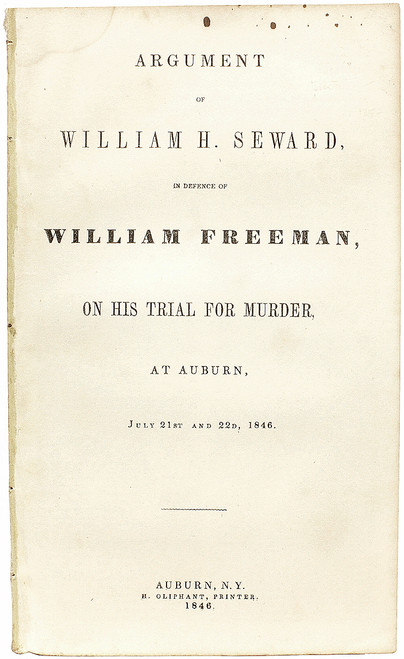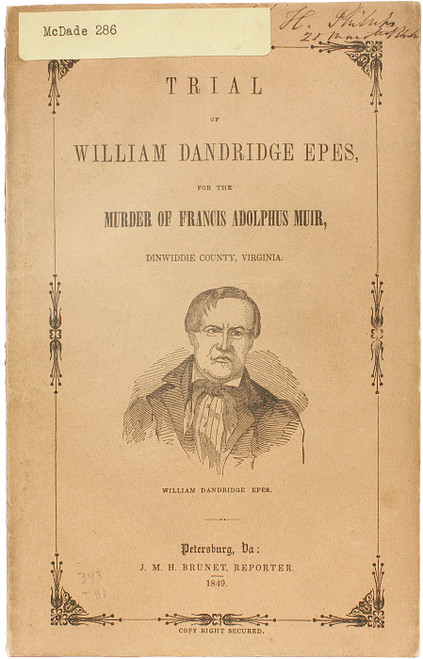
EPES, William Dandridge. Trial of William Dandridge Epes, for the Murder of Francis Adolphus Muir, Dinwiddie County, Virginia. (1849)
- SKU:
- 002228
- Shipping:
- Free within the US $45 flat rate international
AUTHOR: EPES, William Dandridge.
TITLE: Trial of William Dandridge Epes, for the Murder of Francis Adolphus Muir, Dinwiddie County, Virginia: Including the Testimony Submitted in the Case, the Speeches of Counsel, &C. To Which Are Added the Confessions of the Prisoner, an Account of His Execution, &C. &C..
PUBLISHER: Petersburg, VA: J.M.H. Brunet, Reporter, 1849.
DESCRIPTION: 1 vol., 8-7/8" x 5-5/8", 76pp., original illustrated and printed wrappers, original stitching, portrait of defendant on front wrapper, repeated in text.
CONDITION: Internally clean and bright, early ownership signature and paper label at head of front wrap [no text obscured], some minor separating of signatures at the head and fot of the spine, entirely unrepaired and unsophisticated, in NEAR FINE condition.
REFERENCE: Cohen 12532; McDade 286; Haynes 5728; Bryson, Virginia Law Books: Essays and Bibliographies, p. 150.
ADDITIONAL INFORMATION: OCLC locates 7 copies in law libraries. According to ABPC and RBH no copy has ever appeared at auction.
In order to avoid foreclosure of his property in Dinwiddie County, Virginia, Epes murdered Francis Adolphus Muir, the mortgage holder, on February 2, 1846, when Muir showed up to collect payment. Epes shot him and buried the body in a grove of trees on his property. "He faked a series of letters to account for Muir's absence" [McDade]. When the body was discovered in July, 1846, Epes fled to Texas. He was eventually captured almost two years later and tried at Dinwiddie County, where he was convicted and hanged. "Pawning the victim's watch led to the arrest and conviction of Epes for the murder of Francis Muir, who had threatened to foreclose on property he had sold Epes." This is the only separately published contemporary account of a significant Virginia trial, including the prisoner's execution speech. The case was notable enough to be included, with a full introduction, in Lawson, AMERICAN STATE TRIALS, Vol. 3, 1915, pp. 412-520. Adding to its importance in the annals of crime in ante-bellum Virginia was the participation of four distinguished members of the Virginia bench and bar who would later play significant roles in the Confederacy: John W. Nash, presiding judge; William T.. Joynes and Timothy Rives, counsel for the defense; and Thomas Saunders Gholson, counsel for the prosecution. Lawson notes that the evidence against Epes "was very strong on all points, but his lawyers fought strenuously for his life," despite which, only minutes after Gholson's closing argument, the jury returned a guilty verdict of first-degree murder.








